In 1963, a 13-year-old Noori Mohammad ran away from home; in 1970, she fell in love and married; in 1986, she became a sex worker, and in 1987, she was diagnosed with HIV. In 2024, she is a guardian, a mentor, and a hero for over 400 children.
In a society often rigid in its expectations, Noori’s struggle began at an early age. “Home, which is supposed to be a safe space, turned out to be a nightmare due to my identity,” Noori, a , tells The Better India.
“My father, Salim, remarried 40 days after my mother’s demise. Some cultural traditions allow for multiple marriages, and in this case, no one questioned his decision,” she adds. After losing two of her siblings, Noori also tragically lost her mother at the age of four.
Advertisement
Born in Chennai, Noori’s formative years were devoid of the joys of childhood. “My stepmother made it miserable for me. She tortured me,” she says, reflecting on her formative years. Even education — a promising tool for liberation — was snatched away from her. “I was allowed to study for three years, from first to third standard, and then asked to discontinue.”
Outside her household, Noori began to struggle with her identity. Observing the transgender individuals in her community, she felt a connection with them. “I knew that I was different from my friends,” she shares.
“Salim Bhai, your son is walking like a girl,” Noori recalls people telling her father. “My friends teased me for her feminine behaviour. I can’t entirely blame them as they were unaware of a third gender in place,” says Noori. “One day my father got furious and beat me. That day, I decided to run away from home.”
Advertisement
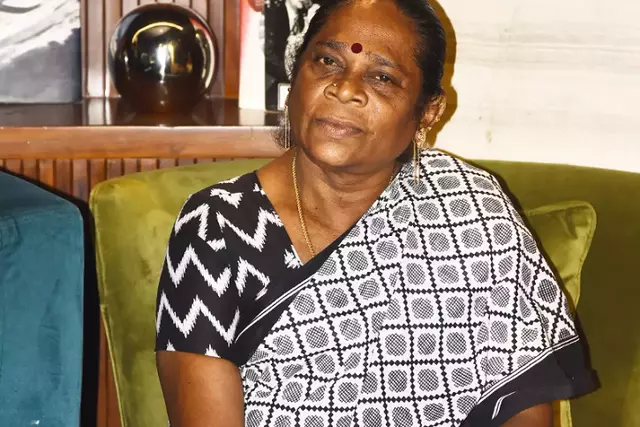
Noori’s life has been full of struggles, but her willpower helped her stand strong against both society and her family.
After she escaped the torment of her household, Noori’s new place of residence, Mannadi, proved to be a ray of independence — financial and psychological — and a starting point for her life’s journey.
“I ran away because I was unable to handle the pressure and ill-treatment received from my family,” says Noori.
However, the streets of Mannadi came with their own set of challenges, as she faced relentless and the constant threat of violence. “For the outer world, I was a boy who was not ‘masculine’ enough,” she shares.
Advertisement
“I started working as a house help to earn my living. I needed a roof above my head to protect myself from external dangers,” she adds. “Rickshaw drivers and other men in that area used to tease me frequently on the roads.”
Noori returned home in 1972 after learning about her father’s passing. But it wouldn’t be long before she’d decide to run away again. “My stepmother, without a proper understanding of my identity, fixed a marriage with another woman,” shares Noori. “It was a Friday, and I told my chithi (step-mother) that I was going to the Masjid as that was the only place I could go alone. I took my clothes and money, and at 6:45 pm, I was on a train, travelling to Bombay (now Mumbai).”
Noori reached Mumbai with aspirations for a better life, but her initial interaction was not pleasant. “I saw a tea shop and I asked the vendor for directions. He refused to talk with me,” she avers.
Advertisement
Noori recalls being approached by Pattama, a member of the Hijra community. “She had a cigar in her hand,” Noori says. “She took me with her and gave me my first pavadai dhavani (half saree) to wear.”
The next seven years in Mumbai, Noori became a part of the Hijra group and got involved in odd tasks, including begging. “I wanted to be a teacher. But I was not fortunate to pursue education. That dream was unachievable.”
As Noori continued to weather life’s storms, a tender bloom of love emerged. She found refuge in Dutta — a military man, who was placed in Mumbai for training. “We both used to talk to each other and spend whatever free time he had after his duties. Slowly it turned into love,” says Noori. “For his sake and for mine, I decided to transform completely into a woman.”
Advertisement
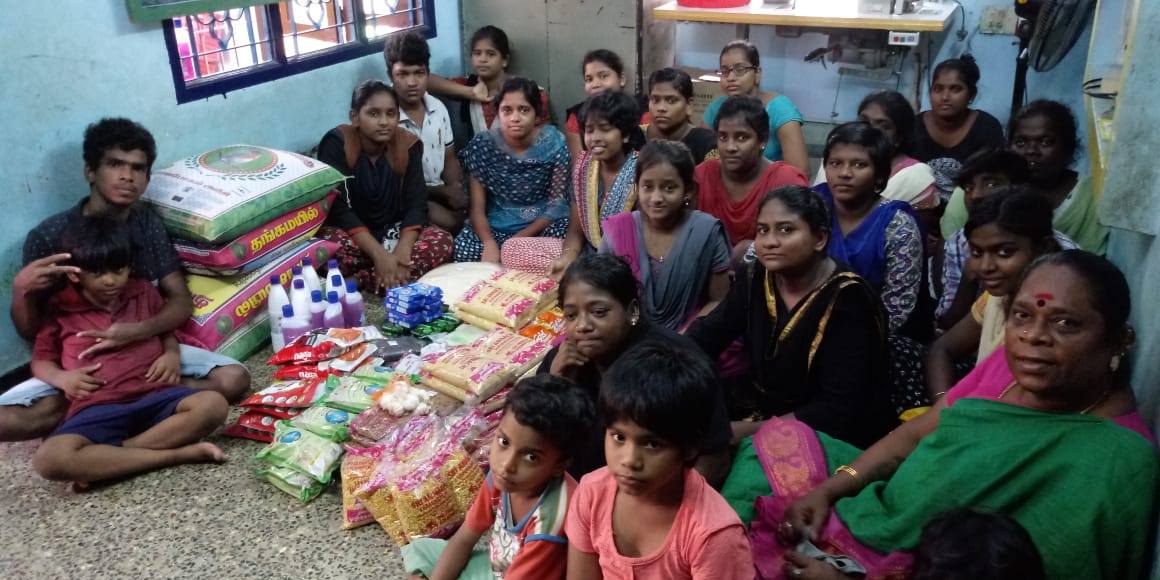
“I’ve always wanted to be a mother,” shares Noori, who is now providing love and care for more than 400 children.
It wasn’t an easy decision. “For this process, there was no involvement of syringe, scalpel or medicines. The male reproductive part is cut directly after praying to Kothaaji Maatha, followed by a 40 day aftercare of applying oil. It was a gruesome process, and it was done by the transgender people themselves.”
But Noori was happy. “I asked Dutta to marry me and we got married in Borgaon, according to the Marathi tradition.”
“I don’t care if she is transgender. She is a woman to my heart, and that’s all that matters,” Dutta said when his mother found out about Noori’s transgender identity, she recalls. “For the first time, I experienced pure love and affection.”
Dutta and Noori moved to Chennai to live a life of their own and shared “16 wonderful years” together; “The happiest of my life,” shares Noori. However, this happiness, too, would be blemished by a tragedy. In 1985, Dutta lost his life in a jet crash.
Life was not easy after Dutta’s death. “He was the best part of my life and losing him was something I could not handle,” says Noori, who had to process this immense grief with no shoulder to cry on. While she wanted to lead a respectable life alone, society would show no kindness.
“I was forced to become a as nobody was ready to employ me for other jobs. I needed to survive, and this job provided me with the money,” she affirms. Outside the social stigma, her profession also came with serious health consequences.
Sexually transmitted diseases were common among sex workers, and Noori often assisted them in . On one such visit to a hospital, Noori saw a poster on HIV and AIDS, urging people to get tested, and stating that there is no cure for the disease. “I used to handle 10 to 15 clients daily and I wondered why this was such a deadly disease,” she says. “On July 22, 1987, I was the second person to be tested positive for HIV in India.”
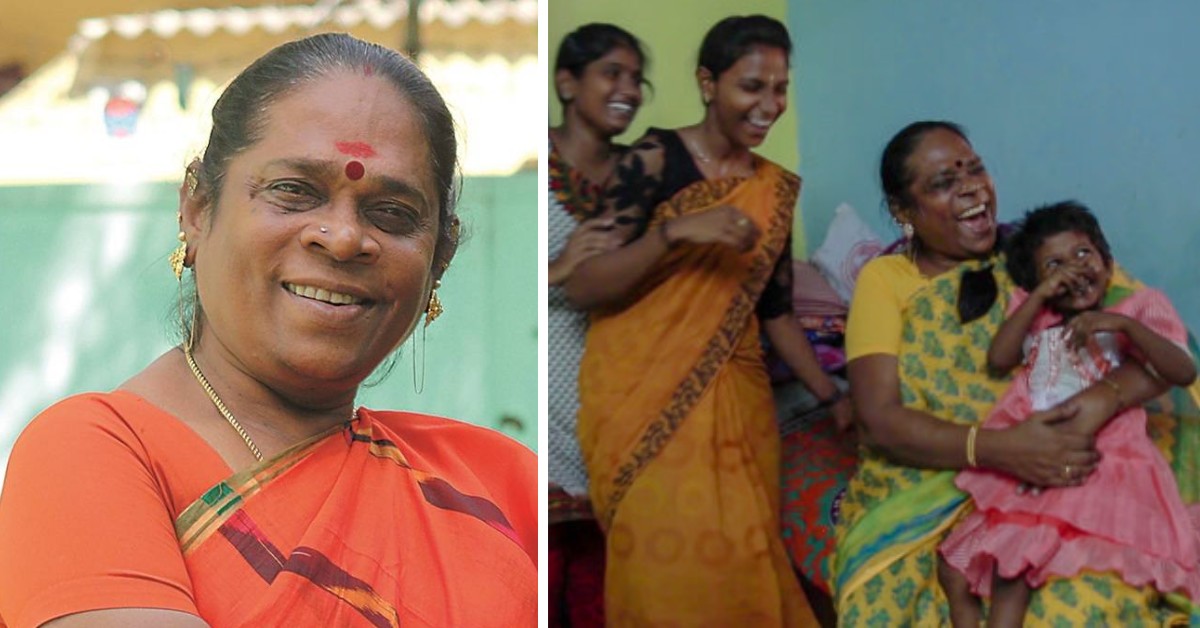
Noori has invested in a space worth Rs 3 crore for the children.
The doctors told Noori that she would live only for a year or two. “I was disheartened for a week, but Dr Usha Raghavan came to my tiny house searching for me, provided counselling and educated me about the condition, which changed my perspective,” she recalls. “I had adopted three kids from a commercial sex worker, so I decided to live for them.”
Dr Raghavan, who saw Noori struggling to make ends meet financially, secured her a job at the STD department in Chennai’s Government Hospital. “I learnt to retrieve blood, dress wounds, and identify medicines,” Noori says. “Dr Raghavan provided a monthly amount of Rs 800, which was essential for my survival.”
Dr Raghavan also encouraged her to join the Community Action Network as an outreach worker. Despite her tireless efforts to raise awareness about HIV, Noori faced severe isolation and discrimination. “I was given pig’s fodder to eat as lunch,” she recalls a disheartening experience during an outreach meeting.
Living with HIV often brings its own set of hurdles. “The stigma surrounding both my transgender identity and HIV status led many to fear and ostracise me and my friends, Selvi, Indira, and Pazhani, who were also living with the virus. I hated it when doctors, who are well aware of the nature of disease, ill-treat their patients,” Noori says. “People treated us like dogs, throwing stones at us, thinking that it is transmitted like the flu virus. I wanted to change that perspective,” she adds.
But Noori continued undeterred, raising awareness about HIV and advocating for the compassionate treatment of all individuals.
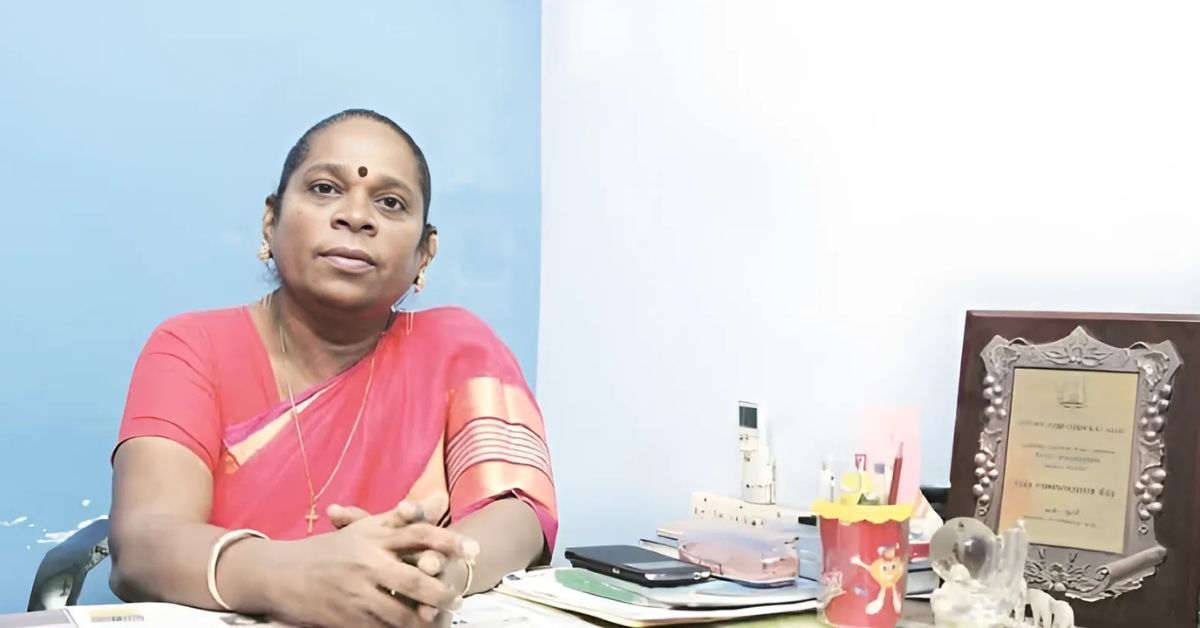
Noori holds over 22 leadership positions and possesses strong oratory and logical skills.
As an outreach worker, Noori started conducting meetings for people affected by HIV. It was during one of these meetings that she met Dr Joseph Williams, the then-director of VHS Hospital. Together, they established the South India Positive Network, an NGO for which Noori was elected president.
“Dr Williams was instrumental in this endeavour,” shares Noori. “Not only did he guide us through the registration process but also provided crucial support in setting up the organisation. I consider him a trusted mentor even today.”
In 2001, for the Tamil Nadu State AIDS Control Society, Noori submitted a proposal to aid HIV positive individuals, written under the guidance of Dr Williams. She was able to secure the project to provide support and care, worth Rs 3.12 lakh for their upliftment, and she executed the same skillfully with just three staff members.
“I worked on over 10 projects and I was promoted to a position where I could recruit more than 70 staff. I have good oratory skills which have created an impact among the listeners, despite my poor educational background. This helped in my journey of leadership,” Noori beams.
In 2003, Noori, supported by Dr Williams, established the SIP Memorial Trust. “He told me that I have good logical reasoning skills, so I don’t have to be hesitant thinking about her lack of education to lead a trust,” shares Noori.
“When the other medical officials perceived my identity as just a transwoman who is HIV positive, Dr Joseph saw my potential and motivated me to start the trust,” she shares. I named the trust SIP in memory of my three friends — Selvi, Indira, and Pazhani — who tragically lost their lives to HIV,” Noori shares.
Initially, the Trust aimed to create awareness and outreach for HIV positive individuals. Later, Noori started focusing on rescuing infants and children who were abandoned because of HIV. “Having experienced a challenging childhood myself, I deeply understand the lasting impact that parents and caregivers have on a child’s mindset. These children are not to blame for their HIV status,” she says.
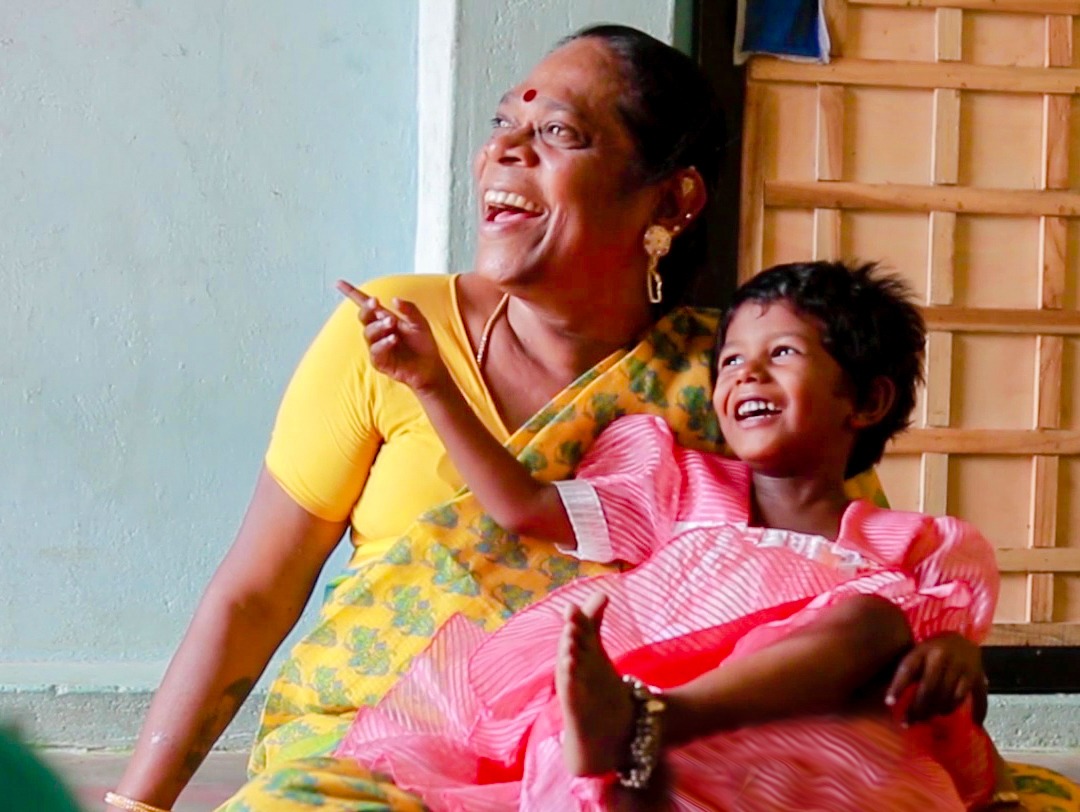
Noori has dedicated her life for these children, saving”I haven’t saved anything for myself. All I do right now is for them and their future,” she shares with a smile.
“I always wanted to be a mother. Providing a them gives me the satisfaction of making crucial changes in society,” she adds.
“The first baby I rescued was a two-day-old female child near the Governmental Hospital. The parents had left a note saying this child is HIV positive and is a disgrace to the family. I decided to provide a good living for the child,” she says, recalling the incident that happened in 2006.
“My goal was to help children with HIV understand that it was just another health condition,” Noori explains. “I didn’t want the disease to define them. I wanted them to be treated with the same care and respect as any other child.”
The Trust provides a comfortable home for children who have tested positive for HIV. “Some are brought in by their parents, some are abandoned, and some are sent from hospitals in Tamil Nadu,” Noori shares.
She has been able to save over 400 , and helped them with education, medicines, food, shelter, and, most importantly, love and affection. Noori has invested in a space worth Rs 3 crore for the children. “I haven’t saved anything for myself. All I do right now is for them and their future,” she shares with a smile.
“Noori aaya (grandma) has always prioritised education and encouraged me to study three degrees,” shares Naga Thejas, who grew up at SIP Memorial, and is currently pursuing his master’s in social work, hoping to start his own NGO to support people in need.
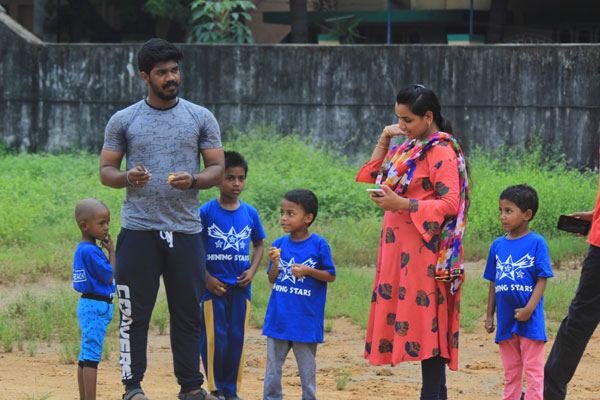
The SIP Memorial Trust provides a comfortable home for children who have tested positive for HIV.
“I was comfortable at SIP home as I used to get healthy and delicious meals every day. I also had my friends, with whom time would fly away,” says Naga, sharing the joy of growing in the safe space created by Noori.
“I am proud to say that I am the first transgender to own a passport and a ration card in Tamil Nadu,” shares Noori, who currently holds 22 leadership positions for multiple organisations and welfare boards. She has been the Coordinator of the South Asia TIDES Foundation (2005 to 2008), a member of the Tamil Nadu Transgender Welfare Board (2008), and Vice President of India People Alliance Combating HIV/AIDS (IPACHA), 2009.
Today, society is more inclusive and aware of the difficulties faced by transgenders and people who are affected by HIV. “The medical advancements help in taking care of the physical aspects, and a comparatively understanding society makes the battles a little easy,” shares Naga.
“People ,” Noori advises. “It’s unfair to abandon your child simply because they have tested positive. I’m living proof that HIV isn’t a death sentence. All you need is the right perspective,” she shares.
Edited by Arunava Banerjee; All images courtesy Noori Mohammad
In a society often rigid in its expectations, Noori’s struggle began at an early age. “Home, which is supposed to be a safe space, turned out to be a nightmare due to my identity,” Noori, a , tells The Better India.
“My father, Salim, remarried 40 days after my mother’s demise. Some cultural traditions allow for multiple marriages, and in this case, no one questioned his decision,” she adds. After losing two of her siblings, Noori also tragically lost her mother at the age of four.
Advertisement
Running away for identity
Born in Chennai, Noori’s formative years were devoid of the joys of childhood. “My stepmother made it miserable for me. She tortured me,” she says, reflecting on her formative years. Even education — a promising tool for liberation — was snatched away from her. “I was allowed to study for three years, from first to third standard, and then asked to discontinue.”
Outside her household, Noori began to struggle with her identity. Observing the transgender individuals in her community, she felt a connection with them. “I knew that I was different from my friends,” she shares.
“Salim Bhai, your son is walking like a girl,” Noori recalls people telling her father. “My friends teased me for her feminine behaviour. I can’t entirely blame them as they were unaware of a third gender in place,” says Noori. “One day my father got furious and beat me. That day, I decided to run away from home.”
Advertisement

Noori’s life has been full of struggles, but her willpower helped her stand strong against both society and her family.
After she escaped the torment of her household, Noori’s new place of residence, Mannadi, proved to be a ray of independence — financial and psychological — and a starting point for her life’s journey.
“I ran away because I was unable to handle the pressure and ill-treatment received from my family,” says Noori.
However, the streets of Mannadi came with their own set of challenges, as she faced relentless and the constant threat of violence. “For the outer world, I was a boy who was not ‘masculine’ enough,” she shares.
Advertisement
“I started working as a house help to earn my living. I needed a roof above my head to protect myself from external dangers,” she adds. “Rickshaw drivers and other men in that area used to tease me frequently on the roads.”
Noori returned home in 1972 after learning about her father’s passing. But it wouldn’t be long before she’d decide to run away again. “My stepmother, without a proper understanding of my identity, fixed a marriage with another woman,” shares Noori. “It was a Friday, and I told my chithi (step-mother) that I was going to the Masjid as that was the only place I could go alone. I took my clothes and money, and at 6:45 pm, I was on a train, travelling to Bombay (now Mumbai).”
Finding comfort, but not for long
Noori reached Mumbai with aspirations for a better life, but her initial interaction was not pleasant. “I saw a tea shop and I asked the vendor for directions. He refused to talk with me,” she avers.
Advertisement
Noori recalls being approached by Pattama, a member of the Hijra community. “She had a cigar in her hand,” Noori says. “She took me with her and gave me my first pavadai dhavani (half saree) to wear.”
The next seven years in Mumbai, Noori became a part of the Hijra group and got involved in odd tasks, including begging. “I wanted to be a teacher. But I was not fortunate to pursue education. That dream was unachievable.”
As Noori continued to weather life’s storms, a tender bloom of love emerged. She found refuge in Dutta — a military man, who was placed in Mumbai for training. “We both used to talk to each other and spend whatever free time he had after his duties. Slowly it turned into love,” says Noori. “For his sake and for mine, I decided to transform completely into a woman.”
Advertisement

“I’ve always wanted to be a mother,” shares Noori, who is now providing love and care for more than 400 children.
It wasn’t an easy decision. “For this process, there was no involvement of syringe, scalpel or medicines. The male reproductive part is cut directly after praying to Kothaaji Maatha, followed by a 40 day aftercare of applying oil. It was a gruesome process, and it was done by the transgender people themselves.”
But Noori was happy. “I asked Dutta to marry me and we got married in Borgaon, according to the Marathi tradition.”
“I don’t care if she is transgender. She is a woman to my heart, and that’s all that matters,” Dutta said when his mother found out about Noori’s transgender identity, she recalls. “For the first time, I experienced pure love and affection.”
Dutta and Noori moved to Chennai to live a life of their own and shared “16 wonderful years” together; “The happiest of my life,” shares Noori. However, this happiness, too, would be blemished by a tragedy. In 1985, Dutta lost his life in a jet crash.
‘I was forced to become a sex worker’
Life was not easy after Dutta’s death. “He was the best part of my life and losing him was something I could not handle,” says Noori, who had to process this immense grief with no shoulder to cry on. While she wanted to lead a respectable life alone, society would show no kindness.
“I was forced to become a as nobody was ready to employ me for other jobs. I needed to survive, and this job provided me with the money,” she affirms. Outside the social stigma, her profession also came with serious health consequences.
Sexually transmitted diseases were common among sex workers, and Noori often assisted them in . On one such visit to a hospital, Noori saw a poster on HIV and AIDS, urging people to get tested, and stating that there is no cure for the disease. “I used to handle 10 to 15 clients daily and I wondered why this was such a deadly disease,” she says. “On July 22, 1987, I was the second person to be tested positive for HIV in India.”

Noori has invested in a space worth Rs 3 crore for the children.
The doctors told Noori that she would live only for a year or two. “I was disheartened for a week, but Dr Usha Raghavan came to my tiny house searching for me, provided counselling and educated me about the condition, which changed my perspective,” she recalls. “I had adopted three kids from a commercial sex worker, so I decided to live for them.”
Dr Raghavan, who saw Noori struggling to make ends meet financially, secured her a job at the STD department in Chennai’s Government Hospital. “I learnt to retrieve blood, dress wounds, and identify medicines,” Noori says. “Dr Raghavan provided a monthly amount of Rs 800, which was essential for my survival.”
Dr Raghavan also encouraged her to join the Community Action Network as an outreach worker. Despite her tireless efforts to raise awareness about HIV, Noori faced severe isolation and discrimination. “I was given pig’s fodder to eat as lunch,” she recalls a disheartening experience during an outreach meeting.
Living with HIV often brings its own set of hurdles. “The stigma surrounding both my transgender identity and HIV status led many to fear and ostracise me and my friends, Selvi, Indira, and Pazhani, who were also living with the virus. I hated it when doctors, who are well aware of the nature of disease, ill-treat their patients,” Noori says. “People treated us like dogs, throwing stones at us, thinking that it is transmitted like the flu virus. I wanted to change that perspective,” she adds.
But Noori continued undeterred, raising awareness about HIV and advocating for the compassionate treatment of all individuals.

Noori holds over 22 leadership positions and possesses strong oratory and logical skills.
As an outreach worker, Noori started conducting meetings for people affected by HIV. It was during one of these meetings that she met Dr Joseph Williams, the then-director of VHS Hospital. Together, they established the South India Positive Network, an NGO for which Noori was elected president.
“Dr Williams was instrumental in this endeavour,” shares Noori. “Not only did he guide us through the registration process but also provided crucial support in setting up the organisation. I consider him a trusted mentor even today.”
In 2001, for the Tamil Nadu State AIDS Control Society, Noori submitted a proposal to aid HIV positive individuals, written under the guidance of Dr Williams. She was able to secure the project to provide support and care, worth Rs 3.12 lakh for their upliftment, and she executed the same skillfully with just three staff members.
“I worked on over 10 projects and I was promoted to a position where I could recruit more than 70 staff. I have good oratory skills which have created an impact among the listeners, despite my poor educational background. This helped in my journey of leadership,” Noori beams.
A shelter for the abandoned
In 2003, Noori, supported by Dr Williams, established the SIP Memorial Trust. “He told me that I have good logical reasoning skills, so I don’t have to be hesitant thinking about her lack of education to lead a trust,” shares Noori.
“When the other medical officials perceived my identity as just a transwoman who is HIV positive, Dr Joseph saw my potential and motivated me to start the trust,” she shares. I named the trust SIP in memory of my three friends — Selvi, Indira, and Pazhani — who tragically lost their lives to HIV,” Noori shares.
Initially, the Trust aimed to create awareness and outreach for HIV positive individuals. Later, Noori started focusing on rescuing infants and children who were abandoned because of HIV. “Having experienced a challenging childhood myself, I deeply understand the lasting impact that parents and caregivers have on a child’s mindset. These children are not to blame for their HIV status,” she says.

Noori has dedicated her life for these children, saving”I haven’t saved anything for myself. All I do right now is for them and their future,” she shares with a smile.
“I always wanted to be a mother. Providing a them gives me the satisfaction of making crucial changes in society,” she adds.
“The first baby I rescued was a two-day-old female child near the Governmental Hospital. The parents had left a note saying this child is HIV positive and is a disgrace to the family. I decided to provide a good living for the child,” she says, recalling the incident that happened in 2006.
“My goal was to help children with HIV understand that it was just another health condition,” Noori explains. “I didn’t want the disease to define them. I wanted them to be treated with the same care and respect as any other child.”
The Trust provides a comfortable home for children who have tested positive for HIV. “Some are brought in by their parents, some are abandoned, and some are sent from hospitals in Tamil Nadu,” Noori shares.
She has been able to save over 400 , and helped them with education, medicines, food, shelter, and, most importantly, love and affection. Noori has invested in a space worth Rs 3 crore for the children. “I haven’t saved anything for myself. All I do right now is for them and their future,” she shares with a smile.
“Noori aaya (grandma) has always prioritised education and encouraged me to study three degrees,” shares Naga Thejas, who grew up at SIP Memorial, and is currently pursuing his master’s in social work, hoping to start his own NGO to support people in need.

The SIP Memorial Trust provides a comfortable home for children who have tested positive for HIV.
“I was comfortable at SIP home as I used to get healthy and delicious meals every day. I also had my friends, with whom time would fly away,” says Naga, sharing the joy of growing in the safe space created by Noori.
“I am proud to say that I am the first transgender to own a passport and a ration card in Tamil Nadu,” shares Noori, who currently holds 22 leadership positions for multiple organisations and welfare boards. She has been the Coordinator of the South Asia TIDES Foundation (2005 to 2008), a member of the Tamil Nadu Transgender Welfare Board (2008), and Vice President of India People Alliance Combating HIV/AIDS (IPACHA), 2009.
Today, society is more inclusive and aware of the difficulties faced by transgenders and people who are affected by HIV. “The medical advancements help in taking care of the physical aspects, and a comparatively understanding society makes the battles a little easy,” shares Naga.
“People ,” Noori advises. “It’s unfair to abandon your child simply because they have tested positive. I’m living proof that HIV isn’t a death sentence. All you need is the right perspective,” she shares.
Edited by Arunava Banerjee; All images courtesy Noori Mohammad
